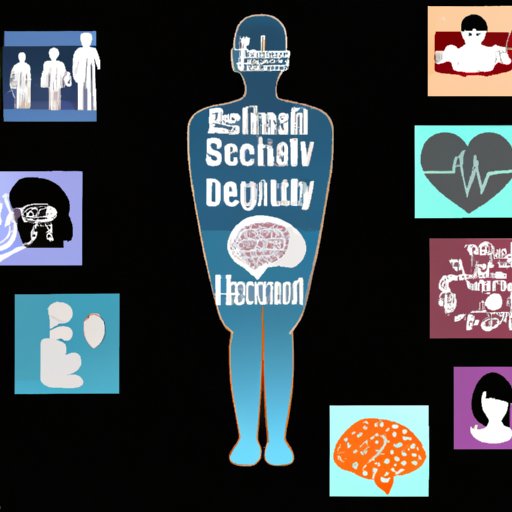Introduction
Mental health refers to a person’s overall psychological well-being. Mental health problems include a wide range of conditions such as depression, anxiety, bipolar disorder, schizophrenia, and post-traumatic stress disorder (PTSD). In this article, we will explore some of the most common causes of mental health issues.
Genetics and Family History
Genetics plays an important role in mental health. Studies have found that certain mental health disorders are associated with specific genes. For example, people with a family history of depression are more likely to develop depression themselves. In addition, researchers have identified genes that increase a person’s risk of developing bipolar disorder and schizophrenia.
Family history is also an important factor in mental health. People who have a close relative with mental health issues are more likely to develop similar issues. This may be due to shared genetic traits, environmental factors, or a combination of both.
Environmental Factors
The environment in which we live can also have an impact on our mental health. Poverty is a major contributor to mental health issues. People who live in poverty are more likely to experience feelings of hopelessness, anxiety, and depression. In addition, poverty can lead to increased stress levels, which can further exacerbate mental health issues.
Loneliness is another environmental factor that can contribute to mental health problems. Loneliness is linked to higher rates of depression, anxiety, and other mental health issues. Additionally, childhood trauma can have long-lasting effects on mental health. Children who experience abuse or neglect are more likely to struggle with anxiety and depression later in life.
Physical Health Conditions
Physical health conditions can also affect mental health. Studies have shown that chronic illnesses such as cancer, diabetes, and heart disease can increase the risk of developing mental health issues. This is due to the fact that these conditions can cause significant stress and disruption to a person’s life, which can lead to depression and anxiety.
In addition, certain medications used to treat physical health conditions can have an effect on mental health. For example, some medications used to treat high blood pressure can cause depression and anxiety. It is important to talk to your doctor if you are experiencing any mental health symptoms while taking medication.
Substance Abuse and Addiction
Substance abuse and addiction can significantly impact mental health. Drugs and alcohol can alter brain chemistry, which can lead to mood swings, panic attacks, and other mental health issues. Additionally, addiction to drugs or alcohol can lead to isolation, financial strain, and relationship problems, all of which can further contribute to mental health issues.
Social Media and Technology
The use of social media and technology can also have an impact on mental health. Excessive use of social media has been linked to depression, anxiety, and low self-esteem. Additionally, the constant bombardment of images and messages can lead to feelings of inadequacy and comparison, which can further worsen mental health issues.
Technology can also have an effect on sleep, which is essential for good mental health. The blue light emitted by screens can interfere with melatonin production, which can cause insomnia and sleep disturbances. This can lead to fatigue, irritability, and other mental health issues.
Conclusion
Mental health issues can be caused by a variety of factors including genetics, family history, environmental factors, physical health conditions, substance abuse, and the use of social media and technology. It is important to understand and recognize the signs of mental health issues so that help can be sought early. Seeking professional help is the best way to manage and treat mental health issues.
(Note: Is this article not meeting your expectations? Do you have knowledge or insights to share? Unlock new opportunities and expand your reach by joining our authors team. Click Registration to join us and share your expertise with our readers.)
